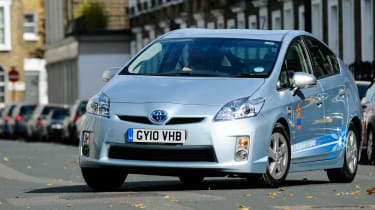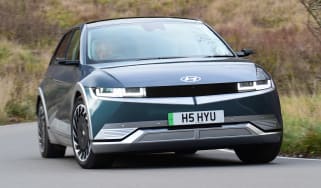Toyota Prius Plug-in
Plug-in version of hybrid favourite promises 135mpg. It’s here next year
This model shows how the Prius Plug-in will shape up – and it looks set to be the best version yet. The electric-only range is ideal for city commutes, and the short charging time makes it feasible to recharge it on a trip to the supermarket. Price is a concern, but the £5,000 Government grant means it shouldn’t be too much more expensive than the standard car.
The Toyota Prius is the car that really brought hybrid technology to the fore, and now the company is aiming to boost its appeal with a plug-in version.
The car isn’t due until 2012, but Toyota has been running a fleet of 20 prototypes – and we got our hands on one for an early first drive. It claims 108.6mpg and 59g/km, but Toyota is targeting figures of 134.5mpg and 49g/km for the production model.
Video: watch CarBuyer's video review of the Toyota Prius
[[{"type":"media","view_mode":"content_narrow","fid":"68431","attributes":{"alt":"","class":"media-image"}}]]
Unlike the standard Prius, which can only function on electric power alone for just under two miles and at speeds below 30mph, the plug-in has a more usable EV range of around 15 miles and at speeds of up to 53mph. It can also be recharged from the mains in about 90 minutes.
More reviews
Car group tests
- Hyundai Ioniq vs Toyota Prius
- Hyundai Ioniq Plug-in vs Toyota Prius PHV
- Toyota Prius PHV vs Kia Optima PHEV vs VW Golf GTE
In-depth reviews
Long-term tests
Road tests
- New Toyota Prius 2023 review: the hybrid superstar now coming to the UK
- New Toyota Prius AWD 2019 review
- New Toyota Prius Plug-in hybrid 2017 review
Used car tests
A few visual clues will give away the production car as a plug-in, too. A new grille and front bumper, plus clear rear lights and Plug-in Hybrid badging, are all set to feature. On the move, it feels like an electric car, with around 80 per cent of the accelerator pedal’s travel available before the engine kicks in. The 15-mile range is achievable and on the basis of our drive, could even be improved.
Once the charge runs out, the plug-in functions much like a normal Prius, with the electric motors seamlessly assisting the 1.8-litre petrol unit for a further range of around 600 miles. There’s more of a tendency for the engine to cut out and allow the electric motors to take over, though.
In our version, there was no button to allow you to run the car in hybrid mode and save the electric-only range, but Toyota plans to introduce this for the production models. This will let drivers use the car in EV mode, for
example, once they reach a city.
Owners of a standard Prius will feel at home in the plug-in model, too. The new lithium-ion battery pack is 38kg heavier than the outgoing nickel-metal hydride set-up, but the ride hasn’t suffered and neither has the handling.
On most surfaces, it’s comfortable enough, but potholes and speed bumps send a thud into the cabin. Unfortunately, the same drawbacks remain, too.
Accelerating hard with the petrol engine running results in a wailing note from the engine as the CVT gearbox delivers power to the wheels. It can feel sluggish, too, with our car taking 13.7 seconds to accelerate from 0-62mph. The production model should cut this to 10.2 seconds.
We found the brakes difficult to use, too, with the regenerative system kicking in too suddenly. This made coming to a stop smoothly more of a challenge than it should have been.
Handling has never been a Prius strong point, and the plug-in is no different. The steering is overly-assisted and numb, making it perfect for busy city streets but not so good for twisty B-roads. There’s a noticeable shortage of front-end grip, too.
The larger battery pack does eat slightly into the boot space of the car we drove, reducing it to 391 litres. However, this will rise to 443 litres on the production model. In short, the Prius Plug-in does everything the standard car does well, but is much more efficient and has the potential to regularly be used purely in EV mode, with Toyota’s data showing that two-thirds of journeys made are less than 13 miles.
Best news of all, though, is the price. Lithium-ion battery technology is still incredibly expensive, so Toyota is targeting a starting price of around £31,000. Deduct the £5,000 Government grant for ultra-low carbon vehicles and the Plug-in costs about as much as a top-spec T Spirit standard Prius.



